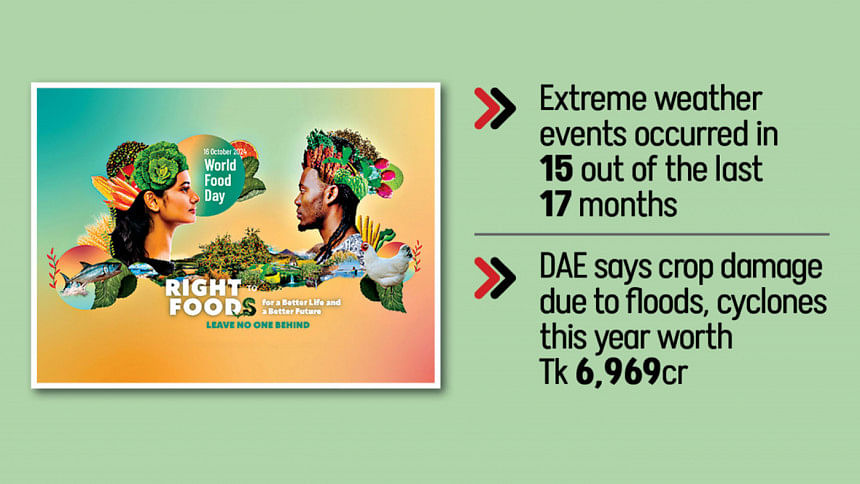Extreme weather events threatening food security

Since May last year, Bangladesh faced more than a dozen extreme weather events -- four cyclones, nine incidents of floods, and multiple spells of heavy rains, heatwaves, and cold waves -- and now they threaten food security.
These events not only harmed individual farmers and food security, but also affected the economy, agriculturists and economists said.
Food security is expected to remain fragile, given the persisting economic constraints, high inflation and likely weather extremes, such as cyclones, during the monsoon season, read the latest report of Food and Agriculture Organisation.
Luckily, the country did not have to import cereal last fiscal year, but the FAO report says it could be among the countries that would import cereals in 2024-25.
Humayun Kabir, a farmer of Kamalganj in Moulvibazar, has been hit by floods four times this year. The Aman crop he planted has been destroyed. Now he does not have any seedlings, and the window for planting the crop is closing.
"… Most of my fields are now abandoned, with sand and silt accumulated on the field," Humayun told The Daily Star.
According to the Department of Agriculture Extension, the extreme weather events damaged four to 15 percent crops in seven to 50 districts since May last year.
The two recent floods in Chattogram, Sylhet, and Mymensingh divisions damaged an estimated yield of about 10 lakh tonnes of Aman just before the plants were to flower, according to the DAE.
The flooding in the eastern region in August-September was unprecedented.
Mujibul Haque, a farmer of Sreechandapur village under Fulgazi upazila of Feni, said Aman on his four acres was destroyed.
"Later, I could plant late Aman variety only on 66 decimals of land. Allah knows how I am going to run my family this year," he said.
According to an assessment by the Centre for Policy Dialogue (CPD), the damage by the eastern flood amounts to at least Tk 14,421.46 crore. The agriculture and forestry sector suffered the highest damage, amounting to Tk 5,169.71 crore.
The DAE data says heavy rains and gusty winds due to Cyclone Remal on May 26 and 27 this year damaged four percent of all crops including Aus, Aman seedlings, maize, jute, sesame, mungdaal, peanuts, vegetables, fruits, and spices in 50 districts.
From June 19 to June 23 this year, flood affected seven districts in Sylhet and Rangpur division that damaged 14 percent crops, including Aus, Aman seedlings, and vegetables.
Just seven days later, another flood hit 14 districts in the north, northeast, and southeastern parts of the country, damaging 13 percent of all crops.
In August, another bout of floods and heavy rains affected 23 districts in the northeast, south, southwest and southeast regions and damaged 15 percent of all crops.
Then, heavy rains on September 12-19 affected 16 districts and damaged around one percent of all crops.
The total damages to crops by floods and Cyclone Remal in 2024 amounts to Tk 6,968.95 crore, according to the DAE.
Bangladesh's demand for rice was 3.70 crore tonnes and the production last year was 3.91 crore tonnes. But by August end this year, the US Department of Agriculture said Aus and Aman rice acreage and production in Bangladesh might decline because of the floods, particularly in the eastern part.
Estimates by the DAE suggests Aman acreage slightly declined to 57.35 lakh hectares this season from 57.5 lakh hectares previously.
The government has set a target of 1.78 crore tonnes of Aman this year, but experts fear the target could be missed leading to a cascading effect threatening food security.
Niaz Md Farhat Rahman, principal scientific officer at the Agriculture Statistics Division of Bangladesh Rice Research Institute (BRRI), said the government provided the farmers with Aman seedlings after the floods in the eastern region, but the target may not be achieved.
"The late Aman may affect the next rice season of Boro too," he said.
Shahidul Islam, an agro-meteorologist at Bangladesh Meteorological Department, said crop production may be affected by the changing weather patterns.
This year so far has been very wet with heavy rains until the second week of October, he told The Daily Star.
He said over the last two decades, the years 2003, 2006, 2018 and 2022 were very dry while 2004, 2007, 2017, 2020 and 2024 were very wet.
"Very dry or very wet years hamper crop production," he said.
Shahidul said the ideal temperature for growth and flowering of Aman paddy [which is now being grown] is 20-36 degrees Celsius during the daytime and 20-23 degrees during nighttime.
Even though the daytime temperature last week was within this range, the nigh time temperature was 23.9 and 25.7 degrees Celsius, he said.
BRRI's Niaz said, "It will be difficult for us to have a stable production of food unless we are capable of dealing with the changes in weather and climate patterns."
He said strengthening early warning system was important so that advanced measures could be taken to protect crops.
The Department of Meteorology, Water Development Board, the DAE, and other agriculture research systems need to collaborate closely, he said.
CPD Research Fellow Muntaseer Kamal said the damage to agriculture could have a significant impact on food security and inflation. He recommended that the government facilitate easy access to agricultural loans for farmers and ensure supply of seeds and other farm inputs for increasing food production.
He recommended that the government take immediate steps for rice imports and reduce import duties on agricultural inputs and commodities.


 For all latest news, follow The Daily Star's Google News channel.
For all latest news, follow The Daily Star's Google News channel. 





Comments